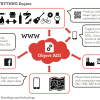The Internet of Things, Taking On a Life Of Its Own
As this article is being published, European politicians and heavyweight representatives of some of the biggest companies in the world have been convening in Brussels, Belgium to discuss the Internet of Things. The event, The 4th Annual Internet of Things Europe: Shaping Europe’s Future Internet Policy – The road to Horizon 2020 was expected to be a significant one, attracting more senior participants than ever this year, such is the growing momentum around the topic.
The Internet (or Web) of Things is the next big wave in the Internet’s development – at least as disruptive as the web itself. Using smart-tagging and advanced connectivity to digitize dumb products – from bikes and bottles to refrigerators and cars – and connect them to the Internet, will allow people and companies to interact with them in new and almost unimaginable ways. Objects will be able to talk to and control each other, and collect, receive and send information. The implications of this are enormous and wide-reaching, and were due to be further unraveled at the conference.
Rob van Kranenburg, founder of a European think-tank on the Internet of Things, is one of the event’s moderators. He notes that this year, in addition to attracting CEOs, CTOs and innovation leaders from major technology and telecommunications companies, there has been a strong senior presence at an EU government level.
“This reflects the growing realization among a wide range of stakeholders that the Internet of Things will be extremely disruptive, affecting everything,” van Kranenburg says. The nearest analogy is what has happened with the Internet and the browser, which over the last two decades have challenged all sorts of business and consumer norms, he adds.
